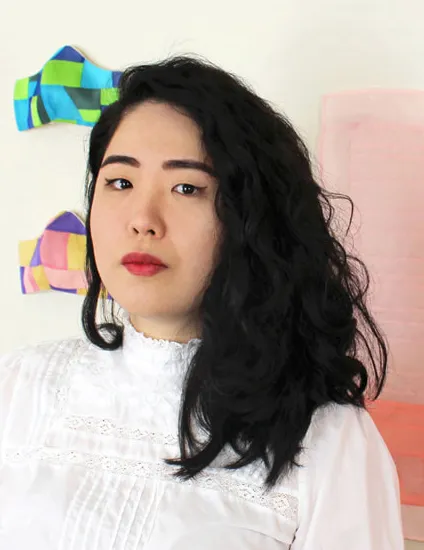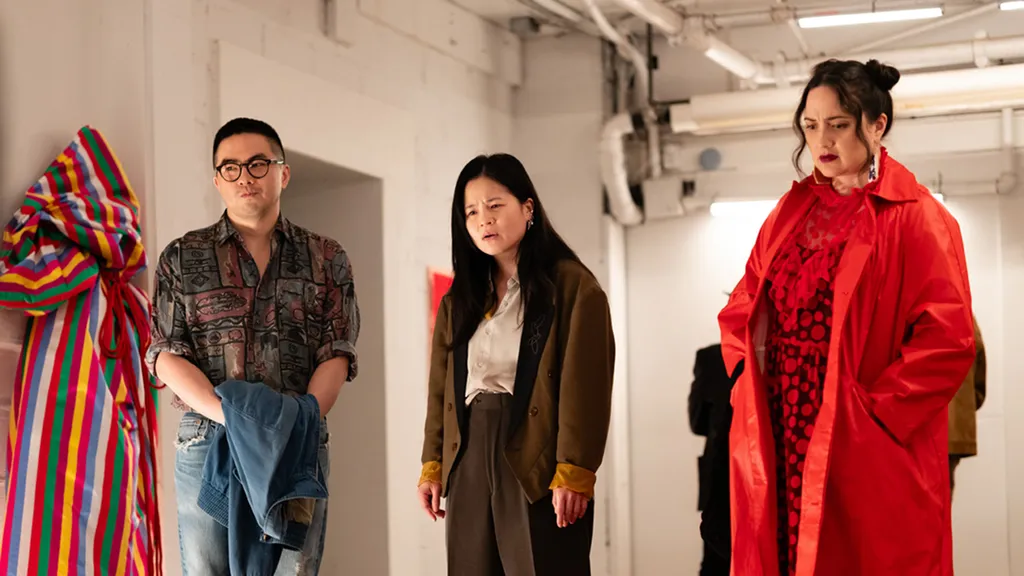- May 14, 2025
- By Karen Shih ’09
The colorful patchworks of visual artist Julia Kwon’s Korean textiles have graced galleries across the country—and now, they’re setting the scene for Oscar- and Emmy-nominated actors in the new movie “The Wedding Banquet.”

“It’s very surreal,” said the University of Maryland art lecturer, who attended the film’s premieres at the Sundance Film Festival and in Los Angeles earlier this year. “It was a really amazing opportunity … to be part of such a humorous and moving film.”
Now in select theaters (and named one of Vanity Fair's best romantic comedies), the movie follows a gay and a lesbian couple as they plan a sham straight marriage to sidestep family homophobia and secure an inheritance. It’s a remake of the 1993 film of the same name; this version stars “Saturday Night Live” staple Bowen Yang, “Star Wars” actor Kelly Marie Tran, Academy Award nominee Lily Gladstone and Academy Award winner Youn Yuh-jung, along with newcomer Han Gi-chan.
Han plays “Min,” a student artist, who makes Korean wrapping cloths called bojagi—and all of textiles artworks seen in his workshop and gallery in the film were created by Kwon.
Bojagi, made out of scraps of cloth sewn together, often in ornate and eye-catching patterns, to carry or store personal items, have been used in Korea since the Joseon dynasty in the late 1300s. Kwon’s modern-day interpretations are artistic creations designed to subvert the Western gaze.

“They were not meant for the human body, but I wanted to wrap figures with them to show the absurdity of the objectification of Asian female bodies,” she said. “Textiles are a good way to borrow a traditional craft and talk about feminized labor and Asian- and Korean-American women’s identities.”
Her work also incorporates data in the form of graphs, charts and maps, showing the rise of anti-LGBTQ bills in the United States or increased prevalence of wildfires. Her subversive messages spoke to director Andrew Ahn, who was looking for a nontraditional bojagi artist and connected with Kwon via a mutual friend, Dave Young Kim, from the Korean American Artist Collective.
“I’m very particular about how I present my work and what it means,” she said. But having respect for Ahn’s past projects, being able to see the script, understand the character and story, and have Zoom discussions before she went to Vancouver to set up her pieces for filming gave her trust in Ahn and his team. She’s thrilled with the way the movie turned out.
“Right now, when LGBTQ histories are being actively erased and identity is being used as a wedge issue to divide us, it feels really important and meaningful to be part of the film,” she said. “It centers and celebrates cultural identity, queerness, love, community and chosen family. Those are all things I deeply care about.”
Interested in seeing Kwon’s bojagi in person? Visit the Smithsonian American Art Museum now through Sept. 14 to see the exhibition “The Shape of Power: Stories of Race and American Sculpture,” featuring 82 works created from 1792 to 2023—including Kwon’s—co-curated by UMD graduate Grace Yasumura Ph.D. ’19.
Topics
Arts & Culture